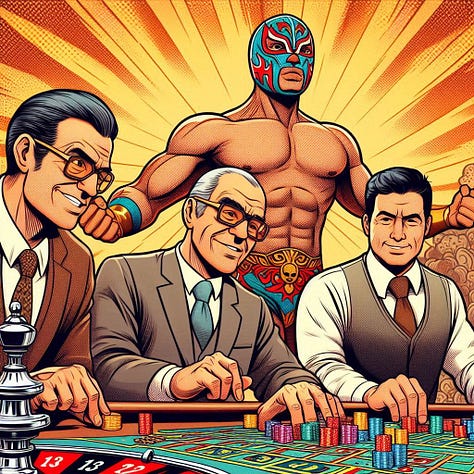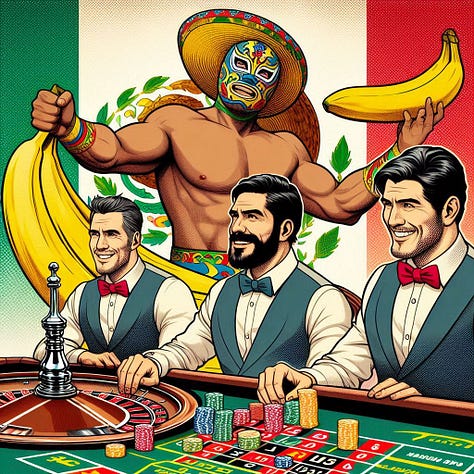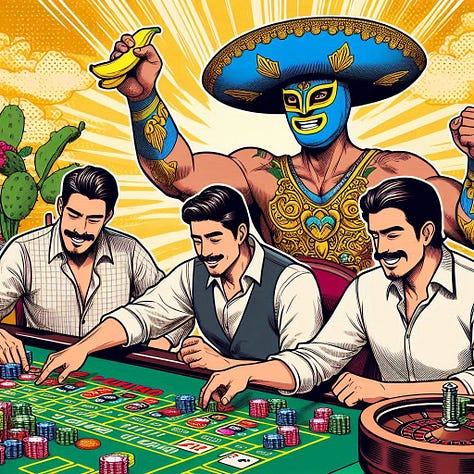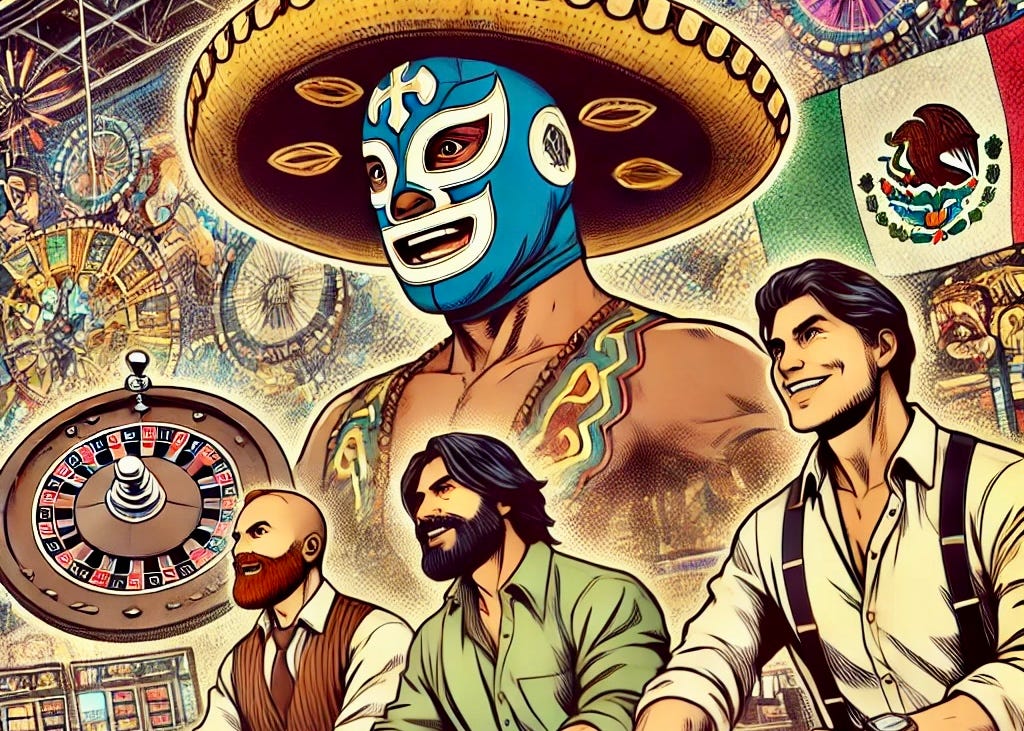My childhood friends are great Regios in that they work all the time—and when they’re not working, they’re talking about how hard they’re working. That’s the culture in Monterrey. It’s work, work, work, even when you’re lounging around drinking beers with your friends at lunch —and if, for some ridiculous reason, you become efficient, the time you free up better be used to add more tasks to your schedule; otherwise, you’ll attract the wrong kind of attention, and people will wonder if you’re working for the Narcos, or worse, they’ll think you’re lazy —in which case, you’ll lose credibility, and your business will suffer.
When upper-class Regios go on vacation, they mostly go to Las Vegas, Can Cun, or South Padre Island in Texas. They visit the same spots so they can find and compare themselves to one another. They keep tabs and want to know who stays where, who dines where, and who spends how much. I’m going to guess that more than 95% of the population on Earth has no idea where Monterrey is, but these guys play it like they’re in charge of turning the wheels of progress.
Ask my friends to go elsewhere —to a land barren of Regios— and they’ll make up excuses: “It’s too much walking.” “They don’t let you smoke indoors.” “I don’t like museums.” So, naturally, I was surprised when Fuentes told me he was coming to Boston. It was the first time we’d met outside of Mexico in my twenty-six years of living in the US.
I drove to the Encore, outside of Boston, which is more of a casino than a hotel. It’s branded as luxurious because the decorations are shiny and golden, but all those places are the same: slot machines, table games, sports on TV, beeping noises, and people pressing buttons like zombies. When I found Fuentes, he was hunched over a blackjack table, fiddling with a chip stack, doubling down on a pair of fives. He stood up, we hugged and went to the bar. I updated him on my wife and five-year-old daughter, and he updated me on his kids, now young adults.
Then his wife arrived with Rey and Cynthia —because there’s always another couple. Regio spouses tend to travel with a spare duo so that women can hang out with women and men can hang out with men. The separation of the genders keeps marriages functional, they say.
The wives wanted to play roulette, so the husbands offered a few bills from the wad they took out of their pockets. The wives grabbed the bills and handed their shopping bags to the men.
“Don’t lose the bags, okay?” Cynthia said.
“We won’t,” Rey said.
“I’m serious,” she said.
“I already told you we won’t lose them,” Rey said.
The wives disappeared around the corner.
“Money is the only way to keep them happy,” Rey said. “What are you drinking?” He asked me.
“I’m good,” I said.
“Come on, man. Really? It’s a special occasion,” Fuentes said.
“I’m fine, thank you,” I said.
“Are you sick?” Rey asked me.
“I’m not,” I said.
“Do you have problems with alcohol?” Rey asked me.
“Not that I know of,” I said.
“Then I’m ordering you a beer,” Rey ordered two tequilas and three Corona beers because some Mexicans travel the world to see if they can find Mexico everywhere.
Fuentes opened one of the shopping bags and showed me a pair of grey tennis shoes with apricot and lime accents.
“Do you like them?” He asked me.
“They are very cool,” I said.
“Do you like the colors?” He asked me.
“I do,” I said, and they both looked at each other and laughed.
“I told you he was gay,” Fuentes told Rey.
“Mega gay,” Rey said.
“I don’t get it,” I said.
“They are my wife’s shoes,” Fuentes said. Then he pulled another pair from the bag. “These are mine,” he showed me the same pair but in black.
“It’s okay if you’re gay,” Rey told me. “We live in different times. One of my brother’s sons just came out as gay.”
“In Mexico?” I asked.
“In Monterrey, yes.”
“How is he dealing with it?” I asked.
“My brother kicked him out of the house, but he took him back three months later. What was he going to do? It’s his son.”
“Times have changed,” Fuentes said.
“It cannot be easy to live in a society where people use the word ‘gay’ constantly as an insult,” I said.
“Mexicans are not as sensitive as Americans in that respect,” Rey said.
“You use the word ‘gay’ to mean ‘feminine,’ which in Mexico is a synonym of ‘weak.’ It’s a huge insult to gays. And women,” I said.
“It’s the same with blacks,” Rey said.
“There’s this guy from Panama who works for me,” Fuentes said. “We call him ‘negro’, and he doesn’t get offended. He laughs about it because he knows it’s just a joke.”
“What else will he do if you’re the boss and he’s probably the only black person around?” I asked.
“We do it affectionately,” Fuentes said.
“You could talk to him about anything else,” I said.
“Americans just want to impose their way of thinking on the rest of the world, but every culture is different,” Rey said.
Rey ordered another round of drinks and handed me a Corona, even though I had only taken a few sips from the first one.
“You need to speed up,” Rey said. “We started hours before you arrived, and look at us,” he said, opening his arms like a matador after stabbing the bull. “I’m going to do a little gambling, and when I come back, you better have finished those beers.” He went and sat at a blackjack table.
“Who is this guy?” I asked Fuentes.
“We have been doing business together. He’s a linkman,” Fuentes said.
“A link to who?”
“He has connections with the government. We’re trying to build a soccer stadium in Tamaulipas.”
He told me how it works: The government opens a contest, and construction companies present their projects. The officials ponder such projects—or pretend to do so—because the one who offers the most “advantages” to the parties involved is always the winner. Rey’s job is to connect Fuentes with the deputy mayor. Fuentes presents his budget, and if the deputy thinks the cost is low enough, he’ll counter with a higher amount, which sounds strange, but this is all done for the sake of the invoices.
Say Fuentes budgets the stadium at two million bananas. The deputy mayor will ask Fuentes if he could invoice it for four million bananas, and if Fuentes agrees, the mayor will pocket two million for himself. The stadium probably costs five hundred thousand bananas, so Fuentes makes one and a half million, from which Rey gets his piece.
“Rey deals with those people. I don’t get dirty,” Fuentes said.
“How can you not?” I asked.
“I don’t ask questions about the invoicing. I just take care of construction. I give Rey his cut, and we move on to the next thing.”
“How else does Rey make a living?”
“He also sells invoices.”
“Why is selling invoices such a business?”
“There’s a risk. You need the government to cover you.”
“So the risk is that you might get in trouble with the same people protecting you?”
“Charro, Tato, and Oscar are also doing it.” (*)
(*) Charro, Tato, and Oscar, childhood friends of ours, have university degrees in accounting, international business, and industrial engineering, respectively.
“So this is what the country is up to these days?” I asked.
“You know how it is,” he said.
“Will you get to build the stadium?”
“It depends on our meeting tomorrow with the deputy mayor.”
“Boston is a long way from Tamaulipas.”
“Officially, he’s here to investigate water treatment options for the state, but the truth is that he loves the Red Sox. I would invite you to the game tomorrow, but we are guests of the government of Tamaulipas.”
“I thought Rey’s job was to care for those things.”
“It is, but look.” Fuentes pulled up his left sleeve and showed me green and purple bruises on his arm. “I also came to see a doctor,” he said.
“What happened?” I asked.
“I had to have my lymph nodes drained,” Fuentes said. “Skin cancer.”
“How bad is it?” I asked.
“The doctors in Mexico told me they removed everything, but I’m still seeing a specialist here in Cambridge. It’s a guy from Monterrey who went to Harvard and stayed here. He’s the best, they say.”
“I’m sorry to hear that you’re not well.”
“It’s what happens when you turn fifty. What are you going to do? But I also came to see you and meet your daughter. I haven’t even seen a photo of her,” he said.
I showed him a photo.
“What grade is she in?” He asked me.
“She’s in pre-K now.”
“I barely remember my kids being five. Do other parents make fun of you?”
“Why would they?”
“Because of the age gap.”
“Nobody makes fun of that here.”
“Come on. People must say something.”
“This is not Monterrey,” I said.
“Maybe they say it behind your back.” Fuentes searched for something on his phone, and I thought he would show me photos of his kids, but it was a photo of a large house by the ocean.
“I bought a small island off the coast of Tamaulipas and built this house almost two years ago.”
“Looks fancy.”
“I haven’t even been there once.”
“Because of the skin cancer?”
“No, because of the narcos. Things heated up, and you can’t even get close to that area without getting shot.”
“I thought the government was protecting you.”
“They’re bigger than the government now. Even if you go by helicopter, they’ll shoot it down with a bazooka.”
“So what are you going to do?”
“I bought land on the Yucatan coast, and I’m building another house there. Rey, Tato, and Oscar bought land next to mine.”
“Is the house ready?” I asked.
“It’s supposed to be ready by the end of the year. Look.” Fuentes showed me a photo of an empty lot.
“Where’s the house?” I asked.
“They haven’t even broken ground. I think we got scammed,” he said.
“What are you going to do?”
“We can’t track down the real estate agents or the construction company.”
“Then I think you’re right. You got scammed.”
He laughed. “That’s the way things are.”
Fun With Artificial Intelligence
For this story’s feature image, I gave the AI the following prompt: “In a format suitable for social media, create an image in Manga style featuring three Mexican men in their 50s sitting at a roulette table. A lucha libre wrestler haunts the background, and he is holding a banana.” Here are some of the results:













Required reading for my next comparative politics class. There's corruption, and then there's corruption...